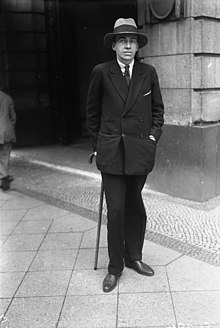Cornelius Vanderbilt IV
| Cornelius Vanderbilt IV | |
|---|---|
 |
|
| Born |
April 30, 1898 Staten Island |
| Died | July 7, 1974 (aged 76) Staten Island |
| Spouse(s) | 7 wives including: Rachel Littleton (m. 1920–27) Mary Weir Logan (m. 1928–31) Helen Varner (m. 1935–40) Maria Feliza Pablos (m. 1946–48) Patricia Murphy (m. 1948–53) Anna Bernadetta Needham (m. 1957–60) Mary Lou Bristol (m. 1967–74) |
| Children | Cornelius Vanderbilt V |
| Parent(s) |
Cornelius Vanderbilt III Grace Graham Wilson |
Cornelius Vanderbilt IV (April 30, 1898 – July 7, 1974) was a newspaper publisher, journalist, author and military officer. He was an outcast of high society who was disinherited by his parents when he became a newspaper publisher. He desired to live a "normal" life but was burdened by large debt and could not maintain the lifestyle associated with his family's social position.
He was born on April 30, 1898 in Staten Island to Cornelius "Neily" Vanderbilt III and Grace Graham Wilson. Throughout his life, the younger Vanderbilt was known as "Cornelius Vanderbilt, Jr." whereas his father, after 1918, was commonly referred to as "General Vanderbilt", as he had served as a brigadier general in the First World War. The younger Vanderbilt was commonly called "Neil" by his family and friends.
Vanderbilt attended Harstrom's Tutoring School and St. Paul's School as a young man. He was preparing to enter Yale University when his studies were interrupted by the entry of the United States into the First World War in April 1917 - shortly before his 19th birthday.
Shortly after the United State declared war on Germany, much to the chagrin of his mother, Vanderbilt enlisted in the U.S. Army in July 1917, at the age of 19. He was originally assigned to the headquarters of the ammunition train of the 27th Division of the New York National Guard, commanded by Major General John F. O'Ryan. His first posting was in Spartanburg, South Carolina where he was a wagoner driving mules. As this assignment was not to his liking, Vanderbilt made a deal with General O'Ryan's orderly into changing his orders to go with the division overseas. In exchange, Vanderbilt became the orderly's assistant and helped with various chores.
He went overseas with the division in May 1918 aboard the transport Great Northern. Upon arriving in Brest, France, he was assigned as an orderly to the commander of the U.S. Army stockade there. Vanderbilt disliked his commander, whom he referred to as "my torturer". By chance, he was able to get a temporary assignment as driver to General Douglas Haig, the commander of the British forces in France. He got the posting when he was in a group of soldiers who asked if anyone knew how to drive a Rolls Royce. Vanderbilt raised his hand since his family only used Rolls-Royces and he was familiar with the peculiarities of their operation.
...
Wikipedia
